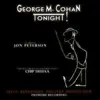


CIUDAD NATAL
Providence, RI
Acerca de George M. Cohan
George M. Cohan was a founding father of American musical theater, whose central legacy to that tradition is commemorated by a statue of him in Times Square. He was born to vaudeville actors Jerry and Nellie Cohan, not on the Fourth of July, as the family claimed, but on the third of July. The family toured as The Four Cohans, with teen-aged George writing sketches and music for their act. His first published song was Why Did Nellie Leave Her Home? in 1893. In 1899 he married Ethel Levey, and she and the rest of the family starred in Cohan's first Broadway musical, The Governor's Son, in 1901. Sam Harris joined Cohan in 1904 to form what would become an extremely successful production partnership. Their first production was Cohan's Little Johnny Jones, with the hit songs "Yankee Doodle Boy" and "Give My Regards to Broadway." Cohan's next big success was "You're a Grand Old Flag" from 1906's George Washington Jr. It became the first published song to sell a million copies. Around the same time, singer Billy Murray began making best-selling recordings of Cohan's songs. The following year, 1907, Cohan divorced his first wife and married Harris' sister-in-law, Agnes Mary Nolan. Cohan had four children: Georgette (from his first marriage), Mary, Helen, and George M. Jr. Until World War I, Cohan and Harris produced and directed numerous plays and musicals, including those written by others. The day after the U.S. entered the war, Cohan wrote the song "Over There," which was quickly picked up by everyone. Even Enrico Caruso recorded a version. Although both Cohan and Harris were known for being fair to actors, the two split professionally after Cohan opposed the Actors Equity strike of 1919 (he eventually became the only actor on Broadway to work on a non-Equity contract). As his popularity waned, Cohan wrote plays, including The Tavern (1920) and Gambling (1929), and his last musical, Billie (1928). He also turned to acting, appearing in the films The Phantom President (1932) and Gambling (1934) and on-stage in Ah, Wilderness! (1933), among other projects. The U.S. Congress awarded him a special medal of honor for "Over There" in 1936, and filming of his biography, Yankee Doodle Dandy, began with his blessing in 1942. Cohan died November 5, 1942, and even if James Cagney's portrayal of him is more well-known now than he is himself, his songs certainly still are a part of American popular music culture.
Canciones más vistas de
George M. Cohan en Abril
Top Artistas
Nosotros
Notas
